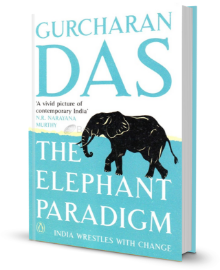

The Elephant Paradigm: India Wrestles with Change
-
1) "The author's attempt to deal with society's big debate on how to combat or combine tradition with modernity is fascinating, as is his take on how the influences of religion, caste and class are moulding individuals and society. Above all, as an Indian, the book makes you feel good about the progress made by the country.
--The Times of India, March 5, 2003 (by Pradipta Bagchi) -
2) "Gurcharan Das is convinced that India will never be a tiger that will charge ahead. It is more like an elephant, wise and sedate. India's failures [he believes] are not failures of ideology or democracy but failures of implementation…Das doesn't just diagnose, he offers prescriptions.
--Indian Express, March 2, 2003 -
3)"After reading The Elephant Paradigm, I ended up admiring much of what this "old-fashioned liberal" has to say….The best thing about this book are the small but vital truths…which our opinion makers often shy away from uttering….Reading The Elephant Paradigm did not make me an optimist about India. But if it was made required reading for every politician and bureaucrat, I'm open to changing my mind."
--Outlook, December 23, 2002 (by Sandipan Deb) -
4) "The elephant, of course, is the Indian economy. Slow to stir, but once up and moving, impossible to thwart….This is, in essence, a book on democracy and capitalism, on which it sways to the liberal side of the fence.
--Business Today, 2 January 2003. -
5) "The author is certainly at his best when it comes to propounding the cause of a right-wing ideology… He recognises the complexities and paradoxes that characterize many aspects of life in this country. He acknowledges that the Indian government's biggest drawback is its failure to provide education and health to the people. He is clear about what he wants—a two party system with the BJP becoming a right-wing conservative party minus its Muslim bashing….What is an outstanding quality in the author is his ability to remain optimistic in the face of all odds.
--Hindustan Times (P. Guha Thakurta), 5 January 2003 -
6) "The Awakening: As a sequel to India Unbound, this collection of eleven essays, which segue from one to another within each section, works well. In contrast to the 1990s when the Indian economy was still grappling with liberalization, The Elephant Paradigm comes when it is much more mature….[Das'] approach is benign yet firm, and refreshingly not in the in-your face-mould that has become a trademark of recent prescriptions."
--India Today (Sanjoy Narayan), 20 January 2003 -
7) "Where did we go wrong?... Das, in this collection of essays…notes the grey if not the dark side of things, while maintaining his perennial optimism…[He] also sees more than what a man in his cocooned circumstances. He tells us of his visit to the Madras Museum at Egmore. 'While I was admiring a Chola bronze, a middle aged South Indian woman came behind me and without self-consciousness, placed a vermillion mark on the Shiva Nataraja. At first, I was appalled, but then I realized that we lived in two different worlds. Mine was secular and hers was sacred. Both of us stood before the statue with different expectations. For me, it was a 900-year-old object of beauty, for her it was God. Mine was aesthetic pleasure, hers was divine darshan'…He then shows the limitations of blinkered secularism. 'This is where our empty secularism has gone awry. Modern, liberal, English educated Indians are losing the holy dimension. They will never know the depth and opulence of the south Indian lady's life."
--Deccan Herald, Bangalore, 12 January 2003 -
8) "He calls it the silent revolution. He naturally praises what the revolution has wrought, but is clearly disappointed that it hasn't wrought enough. The elephant metaphor goes some way but not far enough…He therefore takes the help of the essay form…to explore the roadblocks and to suggest how to get over them….Part two of the book which deals with the private space is indisputably the best part of this very readable work.
--The Book Review, by G.K. Arora, August 2003 -
9) "No recent publication has done greater service to the country than this single work by Gurcharan Das for which the nation has to be grateful to him. There are lots of things that are wrong with India that could set right. But there are writers and columnists who revel in damning the country day in and day out, without once deigning to see the see brighter side of the picture….This is a book to be read, digested, and acted upon…Gurcharan Das comes like a torchlight in the midst of darkness.
--Organizer, 27 June 2004
